(White river Junction, Vermont)
Bringing “only what is needed—essential
toilet articles” in a paper bag,
dressed as for dying, one sees the dying plainly.
These are the homecomings of Agamemnon,
the odysseys to the underside of the web
that weaves and unweaves while the suitors gorge upon plenty
and the languishing sons at home unwish their warring
fathers with strong electric fingers.
The fathers are failing.
In the Hospital Exchange, one sees the dying plainly:
color televisions, beach towels, automatic razors—
the hardware of the affluent society marked
down to cost, to match the negative afflatus
of the ailing, the bandages and badges of their status.
Under the sandbags, rubber hoses, pipettes, bed-clamps,
tax-exempt, amenable as rabbits,
the unenlisted men are bleeding through their noses
in a perimeter of ramps and apparatus.
In that prosthetic world, the Solarium
lights up a junk-pile of used parts: the hip that caught
a ricochet of shrapnel; tattoos in curing meats;
scars like fizzled fuses; canceled postage stamps;
automated claws in candy; the Laser’s edge; and barium.
The nurses pass like mowers, dressing and
undressing in the razor-sharp incisions
and the flowering phosphorescence. The smell
of rubbing alcohol rises on desertions and deprivals
and divorces. It is incorruptible. A wheelchair aims
its hospital pajamas like a gun-emplacement.
The amputee is swinging in his aviary.
His fingers walk the bird-bars.
There is singing
from the ward room—a buzzing of transistors
like blueflies in a urinal. war over war,
the expendables of Metz and Chateau-Thierry,
the guerillas of Bien Hoa and Korea,
the draftees, the Reserves, the re-enlisters,
open a common wavelength.
The catatonic
sons are revving up their combos in the era
of the angry adolescent. Their cry is electronic.
Their thumbs are armed with picks. The acid-rock guitarist
in metal studs and chevrons, bombed with magnesium,
mourns like a country yokel, and the innocents
are slaughtered.
On the terrace, there are juices
and bananas. The convalescent listens to his
heartbeat. The chaplain and his non-combative daughter
smile by the clubbed plants on the portico.
“They shall overcome.”
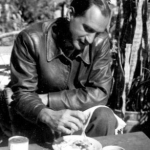





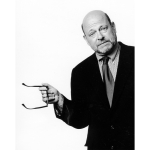




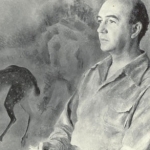
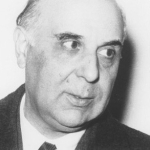
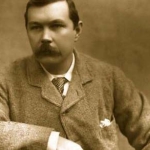

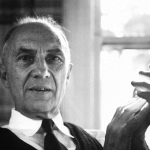

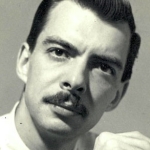

Comment form: